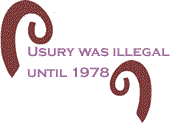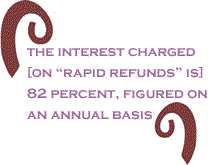
|
||||||||||||||||||||||
|
||
 |
||
The formal charge for the ´┐Żloan shark´┐Ż is usury and it was jarring to learn that he was charged with usury for ´┐Żlending money at an interest rate above 25 percent.´┐Ż We´┐Żve become accustomed to busts for selling drugs everywhere, from inner cities to the smallest rural hamlet, but a charge of usury is not something that comes along every day. Usury is generally defined as the practice of lending money and charging the borrower interest, especially at an exorbitant or illegally high rate. We´┐Żll ignore for the time being that most religions have prohibited the charging of interest, going back in the mists of time. Mostly, though, religions have come to accept the levying of some interest on loans, as the practice of making money without doing any work has become more common in the modern era. So, in the Mohawk Valley of New York, the police are going after the ´┐Żloan guppies,´┐Ż while letting actual loan sharks off the hook, so to speak. What does that mean? Well, for starters, there are the credit card companies, which have been charging as much as 29.9 percent to those who have had the misfortune to miss a payment or have been late in making a payment - even a day or two. Nobody charges them with usury, even though credit card companies have been allowed to raise the interest rates of their customers at any time. Now, there is something called
credit card ´┐Żreform,´┐Ż but that reform is much like some other reforms
that have been made in recent years: It looks good on paper, but
in the end, the credit card companies (in many cases, they are banks)
are still in charge. With the new law, they have to notify their
customers of any rate increase, but there is no limit on those increases.
Debit cards are another matter. Although banks may not charge interest on the use of the debit card, they have a way of charging fees that serve the same purpose. If you write a check, there is not usually a per-check charge, but a fee is charged for each debit card transaction - charged for using your own money. These fees for either kind of card are not interest, but they serve the same function. Since they´┐Żre not interest, the bank can collect $10 or $20 or more several times a year from each card-holder. Because so many Americans carry such a large load of credit card debt, most of them don´┐Żt even notice the fees. They just keep making the minimum payment and maybe a little more. This kind of behavior by credit care companies drives up the cost of using a credit card, whether it´┐Żs called interest or something else. By the time all of this is calculated into the cost of using a credit card, it can be well into the 30 percent or 40 percent range. Historians note that the founders of this nation capped interest rates at 6 percent and usury was illegal until 1978. This was the time of the ´┐Żgreat deregulation.´┐Ż Like the trucking and other industries, restraints on financial institutions became more and more lax. By 2010, there didn´┐Żt appear to be any restraints on usurious behavior. A credit card company that has two million customers can get themselves tens of millions, simply by charging a random $10 fee to a few hundred thousand customers at a time. There have been few CEOs of credit card companies arrested on usury charges in recent memory.
Ten percent doesn´┐Żt sound like so much of a burden of interest, unless it is expressed on an annual basis. Paying 10 percent on a $300 paycheck doesn´┐Żt sound excessive, unless you realize that it may only be for one or two weeks. If you calculate how much that would be if that amount borrowed over a year, at that rate, it would come to between 300 percent and 400 percent. It´┐Żs the same for such enterprises as ´┐Żrapid refund´┐Ż on income taxes. These sharks take a chunk of the refund, to provide a check a few months before it would come from the IRS. That´┐Żs a lot of money, on an annual basis. Forbes.com reported last February that, in one instance, the interest charged was 82 percent, figured on an annual basis and, in some instances, it much more. There are few reports that these bottom-feeders have been arrested for usury anywhere in the country. Rather, the sympathetic authorities make an attempt to ´┐Żregulate´┐Ż this kind of unethical (many would say criminal) behavior. Payday loan businesses over many years proliferated around military bases, charging the same rates of interest, 300-400 percent. Probably only because military personnel were the ones being made victims of these scam ´┐Żloans,´┐Ż there has been some action. Now, these people are allowed to charge ´┐Żonly´┐Ż 36 percent. But, the same outfits are functioning in big cities and still charging the same 300-400 percent interest, on the basis that they provide ´┐Ża service´┐Ż to people ´┐Żwho have little access to credit.´┐Ż The people continue to pay the price. None of those business managers have been arrested for usury. In fact, they are indicative of practices that occur at the highest levels of the American economy and society, yet, no one is ever charged with usury. Rather, it´┐Żs whatever the traffic will bear. Since poor people and people of little means have no other resources, they continue to use the services of the ´┐Żloan´┐Ż companies - and lose a large percentage of their income in the process. It is unclear whether the usury
charge in the recent bar bust was because it was accompanied by
drug charges or whether this signals that law enforcement authorities
in the
If that isn´┐Żt the case, we can expect to see - at least occasionally - a small news report of the arrest of yet another ´┐Żloan guppy,´┐Ż while the sharks slip away. Not much changes. Regular folks pay, in both commerce and in the courts, while the rich rake it in from the former, and get a free pass in the latter. We should try for a little equity, once in a while. BlackCommentator.com
Columnist, John Funiciello, is a labor organizer and former union
organizer. His union work started when he became a local president
of The Newspaper Guild in the early 1970s. He was a reporter for
14 years for newspapers in |
||
If you would like to comment on this article, please do so below. There is a 400 character limit. You do not need a FaceBook account. Your comment will be posted here on BC instantly. Thanks. Entering your email address is not mandatory. You may also choose to enter only your first name and your location.
|
||
Thank you very much for your readership. |
||
| Any BlackCommentator.com article may be re-printed so long as it is re-printed in its entirety and full credit given to the author and www.BlackCommentator.com. If the re-print is on the Internet we additionally request a link back to the original piece on our Website. | ||
| |
||
April 15, 2010 |
| Executive Editor: David A. Love, JD |
| Managing Editor: Nancy Littlefield |
| Publisher: Peter Gamble |
| Est. April 5, 2002 |
| Printer Friendly Version in resizeable plain text format |
 |
 |
 |

|
 |
| |
| |


































 One
of the worst examples of usurious behavior is the so-called ´┐Żpayday
loan´┐Ż business. Instead of cruising the streets in a large car with
tinted windows, these people have opened storefronts to conduct
their business.
One
of the worst examples of usurious behavior is the so-called ´┐Żpayday
loan´┐Ż business. Instead of cruising the streets in a large car with
tinted windows, these people have opened storefronts to conduct
their business.
 If
the latter is the case, we should expect to soon see photos in the
tabloids of ´┐Żperps´┐Ż in $1,200 suits and $100 ties being walked in
handcuffs out of the skyscrapers of Wall Street and other locations
for their daily crimes of usury.
If
the latter is the case, we should expect to soon see photos in the
tabloids of ´┐Żperps´┐Ż in $1,200 suits and $100 ties being walked in
handcuffs out of the skyscrapers of Wall Street and other locations
for their daily crimes of usury.









